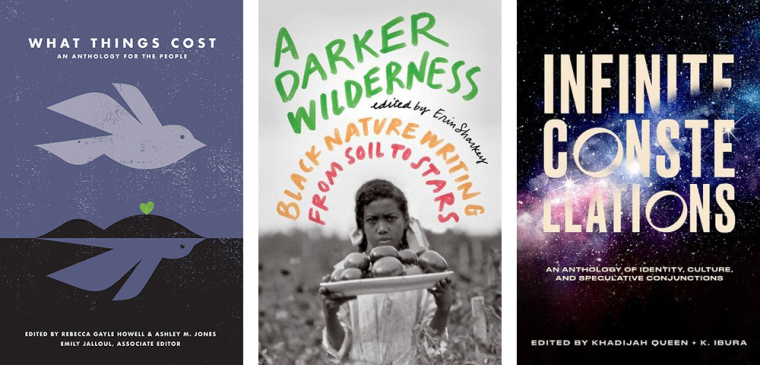Among the many new books published each season is a shelf full of notable anthologies, each one showcasing the work of writers united by genre, form, or theme. The Anthologist highlights a few recently released or forthcoming collections, including What Things Cost: An Anthology for the People.

In “Poetry is Bourgeois,” the opening poem of What Things Cost: An Anthology for the People (University Press of Kentucky, March 2023), Ruben Quesada recalls overhearing a young woman dismiss poetry as time “carelessly spent,” a hobby for the “privileged.” The verse ends on a sharp refutation of the woman’s claim: “This is a lie.” Quesada’s lyric offers a fitting epigraph for a volume billed as “the first major anthology of labor writing in nearly a century”—but which questions what counts as labor as much as it speaks to the grind of traditional employment. In the poem “Riot,” for example, Katie Condon dubs the gestating mother a “fetal / site manager,” contemplating the “seven / thousand hours” of labor performed during pregnancy. The collection also considers the unseen labor of undocumented immigrants, who beyond wage work must bear an unpaid psychic load: how to avoid “the immigration raid,” as José Olivarez recounts in “poem where no one is deported.” Danez Smith brings bleak humor to interrogating poverty’s intersection with racism: “If I went to jail I’d live rent-free but there is no way to avoid making white people richer,” he quips bitterly in “C.R.E.A.M.” Editors Rebecca Gayle Howell and Ashley M. Jones have fashioned What Things Cost, which includes both poetry and prose, as a counter to “exploitative capitalism.” With all royalties slated to go to the Poor People’s Campaign, a revival of Martin Luther King Jr.’s 1968 movement for financial equity, the anthology seeks to fortify proletariat readers: “We hope that inside these pages you will find a story, an experience that values you,” Howell and Jones write.
Editor Erin Sharkey traces her idea for A Darker Wilderness: Black Nature Writing From Soil to Stars (Milkweed Editions, February 2023) to her time teaching writing in a Minnesota prison. From her students, Sharkey learned “that nature can shape our lives, even in unnatural conditions like those experienced by the incarcerated,” she writes in her introduction to the essay collection. With roots in nineteenth century global colonial projects, nature writing has been a milieu “dominated by white, cisgender men with access to resources,” Sharkey notes. Yet “Black folks have been instrumental in the stewardship and care of the land” and maintain their own tradition in the genre, a repository of thought which Sharkey wishes to highlight and expand with A Darker Wilderness. Sharkey’s interest in building an archive reaches beyond the literary: Each essay in the anthology considers what she calls an “archival object,” some material rooted in physical space, whether public or deeply personal. A photograph of a young woman at a civil rights protest in Alabama, for example, grounds Ama Codjoe’s exploration of rain, hair, and Black liberation. Michael Kleber-Diggs contemplates his grandparents’ home as a space of nurturance embedded in nature. Naima Penniman interrogates the meaning of a statue of François Makandal, a Haitian revolutionary, as well as the playhouse where she and her siblings held “environmental meetings” during childhood. “This project claims and reacquaints the unknown by connecting those makers and subjects to contemporary Black thinkers across time and, in turn, rewrites the record,” says Sharkey.
Selves are cultivated and crafted by the norms, institutions, and ideologies of their era, a process that can be constrictive and traumatic, particularly for minority communities. The page, however, offers an opportunity to imagine new worlds for the self to inhabit—and new selves to inhabit the world. This is precisely what editors K. Ibura and Khadijah Queen offer readers in Infinite Constellations: An Anthology of Identity, Culture, and Speculative Conjunctions (University of Alabama Press, March 2023). In this collection of fantastical stories and poems, thirty writers of color “myth-make and myth-invert, transform and transmute, make us belly laugh or hum our understanding or gasp or whisper gently or remember that sometimes we need to holler and fight as we grieve,” write Ibura and Queen in their introduction. In Shakirah Peterson’s “On Bended Knee,” a Zimbabwean woman turns a man into a gudza cloth, which she proceeds to ship to the United States to sell at an African imports shop. In his poem “After,word,” George Abraham envisions a narrative in which “a Palestinian boy sneaks onto a Birthright trip &, with his name, his un-accent, fools everyone, into thinking he Belongs there.” In Lynn C. Pitts’s story “The Swan,” a hip New York City woman begins to grow feathers as she and her friends investigate—and try to thwart—her transformation into the titular creature. “Watch for the organic flow of imagining, the kinship links, the friendship both familial and chosen, long-lived and new-instant,” write Ibura and Queen. “This is a grounding, not just in the worlds we create for ourselves on the page, but in real life.”








